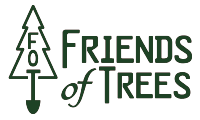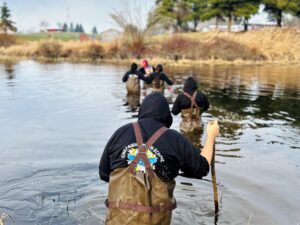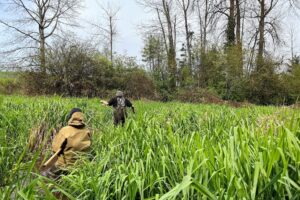Tag: Chemawa Indian School
A Sense of Place
Students at Chemawa Indian School connect with the Indigenous relationship to the land
Friends of Trees has been partnering with the Chemawa Indian School, a Native American boarding school in Salem, for over eight years on a program designed to provide opportunities for students to build knowledge and skills that could lead to careers in the environmental field.
This year, Chase Huntley joined the team as an Education Specialist working with the Chemawa Program. He developed a syllabus around general conservation ecology and restoration, and how it connects to bigger ideas.
“It’s really important to make things culturally relevant,” Chase says. “Communities have always had a relationship to the land to the water. So I wanted to focus on the place we’re at and how it’s important to Indigenous people.”
The course is a combination of classroom, field study, and hands-on activity. The seven high school students in the class are all from different groups around the country, so much of the local land and its history was new to them. Chase hosted guest speakers to talk about Traditional Ecological Knowledge (TEK) specific to the Kalapuya and other nearby tribes.
“Because these students are at a boarding school, I wanted to make sure we got outside as much as possible,” Chase says. “There’s so many benefits to being outside, including getting to know the land.”
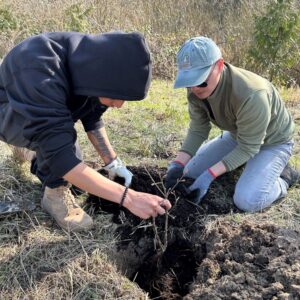
One of Chase’s goals is for the students to shift away from the Western perspective that considers people and nature as separate. From the point of view of Indigenous people, people are intricately involved with nature. “Every plant has a purpose, not just ecologically but also culturally,” he says.
Much of the classroom study considered how Indigenous people have a role in shaping the land. Weekly themes included wildlife, water, restoration, environmental justice, plants, and careers, all with the Indigenous perspective.
Students were able to build a sweat lodge, and make arrows out of willow branches. Some of the hands-on work included blackberry removal and managing other invasive species. They also worked on mulching, planting native plants, and general maintenance.
“I wanted the activities to be student-led and it turns out they really enjoyed blackberry removal, Chase says. “But not just for something to do—we made sure that we understood the why behind what we’re doing.”
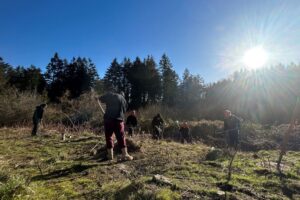
Chase is excited about the momentum the program has. His goal for this year was to build a strong foundation and develop partnerships, something he’ll continue doing next school year.
“I want to get more input from the Confederated Tribes of Grand Ronde,” he says. “There are so many resources on the land that we can study. And I want to get off the campus more too, so that we can see even more of the area.”
With more guest speakers and more field trips, students can continue to connect the dots to the big picture and develop a sense of place connected to the larger watershed and indigenous lands in the area. Students will also train as crew leaders for the first time since before the pandemic, providing them with opportunities to participate in more green space and neighborhood planting events in Salem as both volunteers and crew leaders.
“There’s so much potential with this program,” Chase says. “It all starts with focusing on the place and its importance to Indigenous people.”
Exchanging Knowledge at Chemawa
An education program for Native American students
One day this spring, Harrison found himself waist deep in water in the wetlands on the campus of the Chemawa Indian School, a Native American boarding school in Salem. Harrison, a Green Space Specialist with Friends of Trees, was there with six Chemawa students who enrolled in a class on outdoor education and habitat enhancement.
“Getting outside, away from the classroom, I got to see the students have a moment of immersion and creative discovery,” Harrison says. “They weren’t just looking for critters, they were also thinking about what that means for the environment.”
Friends of Trees has been partnering with the Chemawa Indian School for over seven years on a program designed to provide opportunities for students to build knowledge and skills that could lead to careers in the environmental field.
This year, the program had six students between 16 and 18 years old. The program includes a combination of classroom and field study. In the past, students trained as Friends of Trees Crew Leaders and participated in events, but the pandemic has made that difficult in recent years.
“The pandemic has limited field trips, so it’s been more of a stationary program on campus,” says Meng, another Green Space Specialist who works with the Chemawa students. “We’ve had to adapt and be creative, but we still have the aim to spark interest in green work.”
Luckily, there is a wetland right on campus, where students were able to test the health of a stream, plant trees and native plants to improve that health, and learn to identify plants and wildlife. They also learned how to safely use tools to improve habitat, remove invasive species, and maintain trails.
Friends of Trees provides this programming alongside Elderberry Wisdom Farm, an organization that provides opportunities for Indigenous youth to strengthen their traditional ties with the land and to build career pathways. The Chemawa program incorporates storytelling and traditional ecological knowledge (TEK), which often takes a longer view and more holistic approach to habitat restoration.
“I’ve really appreciated having the opportunity to learn about TEK from Elderberry Wisdom.” Harrison says. “We want to use our resources to empower Native organizations like them.”
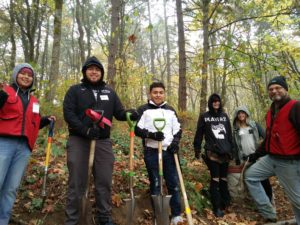
The goal is to merge TEK with other career building skills, so that the students can see a possible path in the green workforce after they leave Chemawa, and have a sustained interest in issues like tree canopy, water resources, and climate change. Meng and Harrison got to see some of that spark, especially when they took the students out of the classroom and into the field.
“When I got to plant with the students, I could see that they were genuinely excited to plant,” Meng says. “They got to plan where the plants could go, and have ownership over the process.”
The program has an opportunity to grow, especially with a deepened relationship with Elderberry Wisdom Farm. In the future, we hope to once again provide crew leader training to the students and have them lead volunteers at planting events. On campus, there’s room to enhance the wetland by planting a more diverse palette of native plants and adding trails so that students can go there and feel a connection to nature, maybe without having to get waist deep in water.
Get to know our partner: Chemawa Indian School

Friends of Trees has been partnering with Chemawa Indian School in Salem for more than five years. Our partnership includes training Chemawa students as Crew Leaders for our planting events in Salem and engaging hundreds of Chemawa students at tree planting and tree care events, including activities at the Chemawa Indian School campus.
This partnership has been driven by dedicated teachers and staff at Chemawa who are passionate about creating opportunities for the students to participate in their community through improving the environment while building their leadership skills.
Chemawa teacher Paula Stuart explains why the partnership is so valuable to Chemawa, “Friends of Trees’ offer to donate trees on Chemawa’s campus has increased awareness of the importance of environmental stewardship. Students who might not have otherwise noticed have joined in, sometimes merely tempted by donuts and hot chocolate, then catching the joy of working outside in teams of happy diggers.”
Paula continues, “Science teachers at the school have offered credit for participation and I am ever so happy that this active engagement has influenced several students’ interest in pursuing environmental careers.”
Finish reading here, where you will find the entire November edition of Treemail, our monthly e-news. Want to catch up on past issues of Treemail? They’re here!
